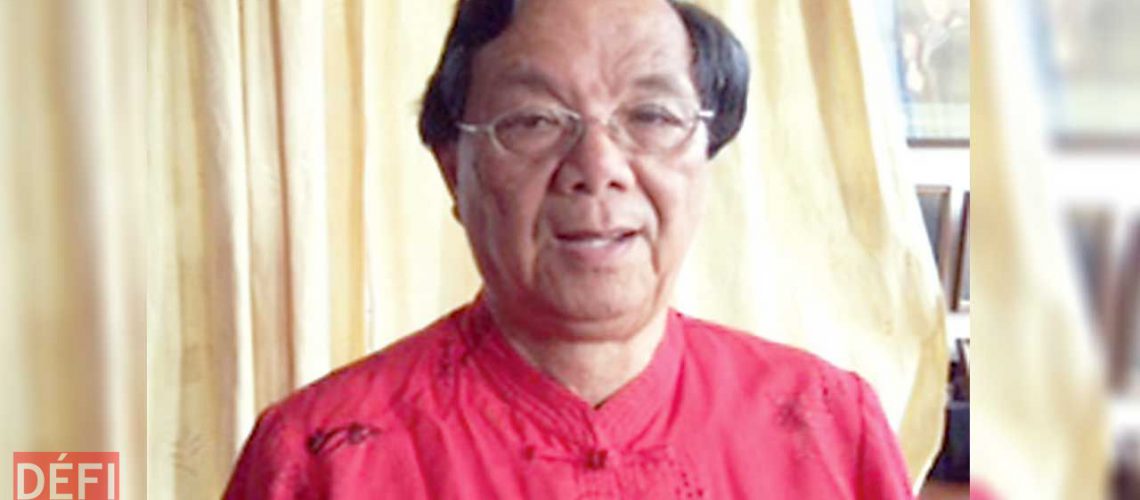Stopovers in a poet’s world’ of Joseph Tsang Mang Kin, a collection of ten anthologies of sonnets unravelling an array of topics, brings a wisp of fresh air to the literary landscape. The book published out of the President’s Fund for Creative Writing in English, was launched on 13th October at the Municipal Council of Port Louis in the presence of Honourable Minister Mukeshwar Choonee and the Lord Mayor Sheikh Mukhtar Hossenbaccus and other personalities In his introductory note, the poet admitted that he must have been in his early youth under the spell of The Charm of Poetry of J.D. Revington. In his eighties he returned to poetry in English after having delved into historical writings.
The poems of Joseph Tsang Mang Kin unravel the mind of the poet. Patriotism is one of his dominant feelings and it led him to devote his capital effort to it. He sings the beauty of his native land, its uniqueness and its cultural wealth. He expresses his love for Mauritius. “How lucky not to have been born elsewhere’…./ Blessed indeed we are to circulate./ Inside the world’s riches in just one place” (Born in Mauritius”.) He says “There’s only one country in the whole world/where people tolerate and celebrate/Cultures that mix and flourish side by side/And merge their deep roots inside our psyche.” (There’s only one country). Through his poems, the history of Mauritius is unravelled to us – the historic events which have marked the destiny of the country. He recounts the past events with lucidity and authority. He pays a glowing tribute to the three Great Builders of our island, notably Mahe de Labourdonnais, Sir John Pope Hennessy and Cha Cha Ramgoolam. (Three Great builders). On the poem ‘Adrien d’Epinay’, he stigmatizes the white oligarchy “ And to this day through banknotes and the press/They still control your view’s and your fortunes” He spares no efforts to unveil to us the important stages of the history of Mauritius’: the struggle for independence (why we wanted independence), in ‘1971 – Annee de Braise’, he points out: ‘Now with the hindsight we know Chacha was right /To lock up the wild pack and do his job” It was “a stratagem to strangle the country,” by some. In ‘Human Rights in 1982’, he writes: “This is the year they murdered human rights and in’’ Witch-Hunting from 1982”: “The murderers of human rights must know/they owe apologies to their victims”.
With nostalgia and resignation the poet writes on China Town, the place of his early childhood and adolescence and also the gateway of the Chinese Immigration to Mauritius And he shows the deep metamorphosis taking place there:the vestiges of the past still remain (Heen Foh, Xin Fa , the Student’s Book Club and Chung San Hall) in spite of modernity and they are the privileged witnesses of the Chinese diaspora. In “It takes us long’’, he says philosophically. ‘’ ‘And whatever you do, do it with love”.
Reading his poems we are carried away by the rhythm. His sonnets are well-elaborated in their forms and contents. The land of his ancestors(China) has inspired him to write many a beautiful sonnet. The poet in spite of his western education has preciously preserved his Chineseness. We can feel it in his poems. He is deeply imbued with Confucianism which ‘’ makes our life easy and smooth for all ‘’(Honour to Confucius). He chants sublimely his origin of Hakka and of the beauty of Hakka language. He has a profound veneration to Guan Di:’’Guan Di is a symbol and Patron Saint /Who inspires and binds our Diaspora.’’ He hails with pride the emergence of the sleeping Dragon”: ‘With top leaders you now rise to the top!” “Now bent on ending western dominance” (Lost face regained). His poems in this anthology show his mastery of Chinese Civilisation and Culture. His love of China has driven him to unearth the intricacies of his ancestral culture deeply embedded in his soul. In the poem Entering the Chinese Mind he laments that there is a world of difference between a European and a Chinese in their concept of life.” ”That is why we don’t convert or colonize’’ We pursue Happiness, Wealth and Long Life’’. We donot have Adam and Eve but Fuxi and Nuwa as our first parents. The notion of sin is banished from the Chinese psyche.I n Ancestors Worship He depicts vividly to us the millennial ritual which is at the basis of Chinese Culture. Moreover he considers that China has a different concept of democracy. In ‘Without voting”, he says “We’ve never known or cared about voting/Once in a while every five years/What we demand is our bowls of rice/clothes for us and a roof on our heads”. For him he considers: why talk of democracy if our stomachs are empty. To the Tibetans “How can you be so ungrateful and not/ Understand the favour we’re doing you? ”His perception and judgements are perspicacious. His tone is categorical and uncompromising. What stamps his poems is the quality of his fearlessness and his candour. His flow of words make the poems easy to read and assimilate.
Joseph Tsang Mang Kin pays a great homage to women. “You are the Nile, the Ganges and Huang He/You have no end! You are the beginnings’. This poem was read out with much emotions by his youngest sister, Mrs Salette Siao during the launching of the book. In Woman! Mother! “there’s no life without you”. He talks of the Yin and the Yang in ‘Feminism’ .He has travelled far and wide across and he has bottled his observations and experiences in some of his poems. He talks of Gaza, Iraq and Palestine. For the Tamils Tigers he writes :I feel sorry for the Tamils Tigers. He denounces with vehemence the Racist Malaysia. The poet is a cosmopolitan in his outlook on life. In the poem Divali he salutes ‘’the triumph of light over darkness’ ’In Prana and Qi he talks of the two oldest cultures that live (Indian and Chinese) only separated by the Himalayas. In Africa! Africa! the poet cries out:’’Is there no one to want to change all this?’’when unnamed faceless millions are starving to death.
The poet juggles with words to drive home his feelings and messages. The book Stopovers in a poet’s mind treasures a rich wealth of knowledge of a wide range of subjects. It will be a rich legacy to hand over to the generations to come and will be a boost to many budding poets. The lovers of literature especially will surely relish over such unique anthologies in Mauritian writing.
Philip Li Ching Hum

